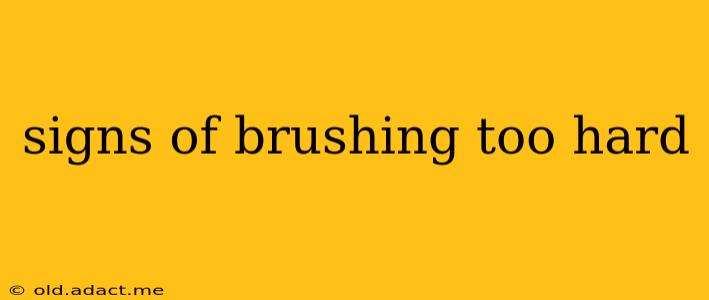Brushing your teeth is essential for maintaining good oral hygiene, but did you know that brushing too hard can actually damage your teeth and gums? Many people are unaware of the detrimental effects of aggressive brushing, leading to various oral health problems. This comprehensive guide will outline the key signs you're brushing too hard and provide expert advice on achieving optimal oral hygiene without causing harm.
What are the Signs of Brushing Too Hard?
Recognizing the signs of over-brushing is crucial for preventing long-term damage. Here are some key indicators:
-
Bleeding Gums: This is perhaps the most common and obvious sign. If your gums bleed regularly after brushing, it's a strong indication that you're brushing too forcefully. Healthy gums shouldn't bleed during gentle brushing.
-
Receding Gums: Over time, aggressive brushing can wear away the gum tissue, leading to gum recession. This exposes the roots of your teeth, making them more sensitive and vulnerable to decay. You might notice your teeth appearing longer than before.
-
Sensitive Teeth: If your teeth are unusually sensitive to hot, cold, or sweet foods and drinks, excessive brushing could be a contributing factor. The enamel protecting your teeth's nerves can be eroded by harsh brushing.
-
** Worn Tooth Enamel:** Severe cases of aggressive brushing can lead to visible wear and tear on your tooth enamel. This can result in a rough or uneven tooth surface and increase your risk of cavities. You might even notice a change in your teeth’s color or appearance.
How to Tell if You're Brushing Too Hard?
Beyond the physical signs, consider your brushing technique:
-
Are you scrubbing back and forth with significant pressure? A gentle, circular motion is much more effective than aggressive scrubbing.
-
Do you brush for too long? While brushing for two minutes twice a day is recommended, excessively long brushing sessions, even if done gently, can still contribute to gum irritation.
-
Do you use a hard-bristled toothbrush? Opt for a soft-bristled brush to minimize damage to your enamel and gums.
What Happens if You Brush Too Hard?
The consequences of brushing too hard are far-reaching and can impact your long-term oral health:
-
Gingivitis and Periodontitis: Consistent aggressive brushing can inflame your gums, leading to gingivitis (gum inflammation) and, if left untreated, periodontitis (gum disease). Periodontitis can cause tooth loss.
-
Tooth Sensitivity: As mentioned, aggressive brushing can wear away the protective enamel, exposing the dentin and causing sensitivity to temperature changes and certain foods.
-
Increased Risk of Cavities: Damaged enamel makes your teeth more susceptible to cavities, which require costly dental intervention.
-
Tooth Loss: In severe cases, the combined effects of gum recession and tooth decay can result in tooth loss.
What Should I Do if I'm Brushing Too Hard?
Changing your brushing habits is key to protecting your oral health. Here's what you should do:
-
Switch to a soft-bristled toothbrush: Softer bristles are gentler on your gums and enamel.
-
Use a gentle, circular motion: Avoid scrubbing back and forth. Instead, use small, gentle circular strokes.
-
Reduce brushing pressure: Be mindful of how hard you're pressing. Aim for a light touch.
-
Brush for the recommended two minutes, twice daily: Don't exceed this time.
-
Consider an electric toothbrush with a pressure sensor: Many electric toothbrushes have sensors that alert you if you're brushing too hard.
-
Visit your dentist regularly: Regular checkups are crucial for early detection and treatment of any oral health problems.
How can I improve my brushing technique?
Mastering the correct brushing technique is crucial for maintaining optimal oral health without causing harm. Here’s a step-by-step guide:
-
Use a Soft-Bristled Toothbrush: Opt for a toothbrush with soft bristles to minimize the risk of gum damage and enamel abrasion.
-
Angle the Brush: Position the brush at a 45-degree angle to your gum line. This helps to effectively clean beneath the gum line and remove plaque and debris.
-
Gentle Circular Motions: Instead of harsh scrubbing, use short, gentle back-and-forth motions or small circular strokes. Avoid aggressive brushing.
-
Clean All Surfaces: Ensure you thoroughly clean every surface of each tooth, including the outer, inner, and chewing surfaces.
-
Don't Forget Your Tongue: Gently brush your tongue from back to front to remove bacteria and freshen your breath.
-
Rinse Thoroughly: After brushing, rinse your mouth thoroughly with water or mouthwash to remove any leftover toothpaste and debris.
By following these tips and being mindful of your brushing technique, you can safeguard your smile and maintain healthy teeth and gums for years to come. Remember, gentle is better!
